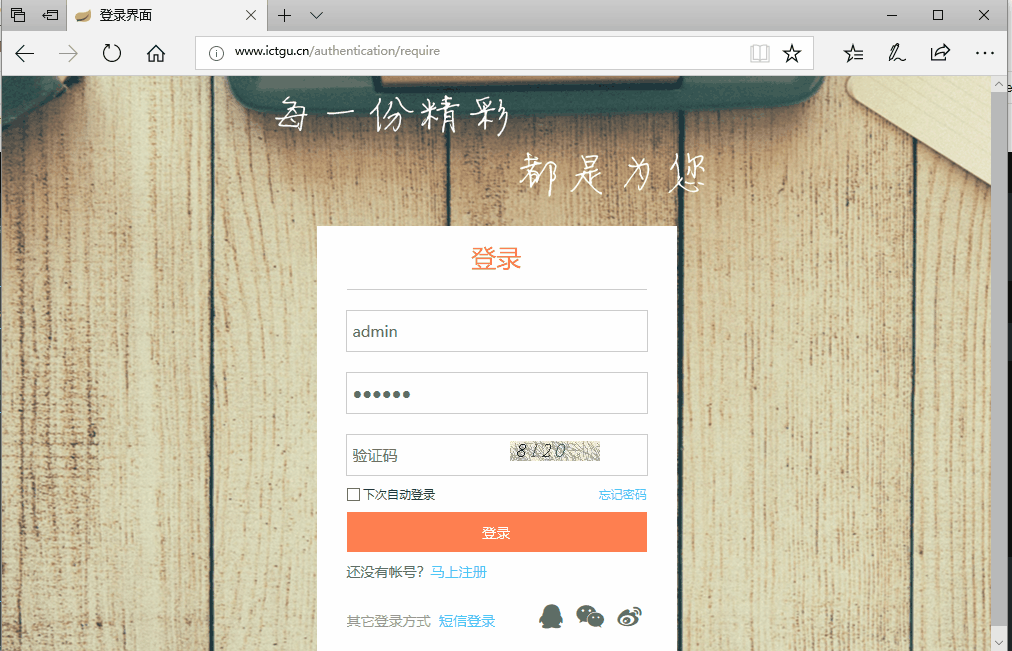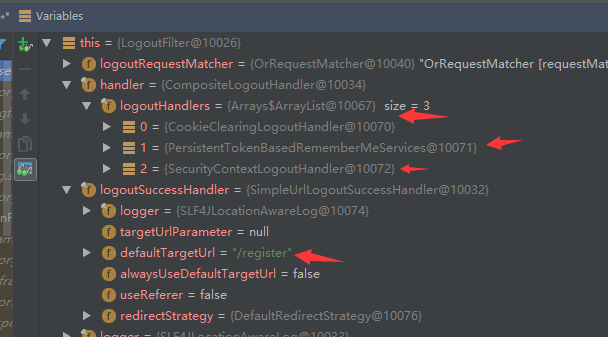Spring Security是一个能够为基于Spring的企业应用系统提供声明式的安全访问控制解决方案的安全框架。它提供了一组可以在Spring应用上下文中配置的Bean,充分利用了Spring IoC,DI(控制反转Inversion of Control ,DI:Dependency Injection 依赖注入)和AOP(面向切面编程)功能,为应用系统提供声明式的安全访问控制功能,减少了为企业系统安全控制编写大量重复代码的工作。
退出原理
- 清除
Cookie - 清除当前用户的
remember-me记录 - 使当前
session失效 - 清空当前的
SecurityContext - 重定向到登录界面
Spring Security的退出请求(默认为/logout)由LogoutFilter过滤器拦截处理。
退出的实现
- 主页中添加退出链接
<a href="/signOut">退出</a> - 配置MerryyouSecurityConfig
...... .and() .logout() .logoutUrl("/signOut")//自定义退出的地址 .logoutSuccessUrl("/register")//退出之后跳转到注册页面 .deleteCookies("JSESSIONID")//删除当前的JSESSIONID .and() ......
效果如下
源码分析
LogoutFilter#doFilter
public void doFilter(ServletRequest req, ServletResponse res, FilterChain chain)
throws IOException, ServletException {
HttpServletRequest request = (HttpServletRequest) req;
HttpServletResponse response = (HttpServletResponse) res;
//#1.匹配到/logout请求
if (requiresLogout(request, response)) {
Authentication auth = SecurityContextHolder.getContext().getAuthentication();
if (logger.isDebugEnabled()) {
logger.debug("Logging out user '" + auth
+ "' and transferring to logout destination");
}
//#2.处理1-4步
this.handler.logout(request, response, auth);
//#3.重定向到注册界面
logoutSuccessHandler.onLogoutSuccess(request, response, auth);
return;
}
chain.doFilter(request, response);
}
- 匹配当前拦截的请求
- 处理 清空
Cookie、remember-me、session和SecurityContext - 重定向到登录界面
handler
CookieClearingLogoutHandler清空CookiePersistentTokenBasedRememberMeServices清空remember-meSecurityContextLogoutHandler使当前session无效,清空当前的SecurityContext
CookieClearingLogoutHandler#logout
public void logout(HttpServletRequest request, HttpServletResponse response,
Authentication authentication) {
for (String cookieName : cookiesToClear) {
//# 1.Cookie置为null
Cookie cookie = new Cookie(cookieName, null);
String cookiePath = request.getContextPath();
if (!StringUtils.hasLength(cookiePath)) {
cookiePath = "/";
}
cookie.setPath(cookiePath);
cookie.setMaxAge(0);
response.addCookie(cookie);
}
}
Cookie置为null
PersistentTokenBasedRememberMeServices#logout
public void logout(HttpServletRequest request, HttpServletResponse response,
Authentication authentication) {
super.logout(request, response, authentication);
if (authentication != null) {
//#1.清空persistent_logins表中记录
tokenRepository.removeUserTokens(authentication.getName());
}
}
- 清空persistent_logins表中记录
SecurityContextLogoutHandler#logout
public void logout(HttpServletRequest request, HttpServletResponse response,
Authentication authentication) {
Assert.notNull(request, "HttpServletRequest required");
if (invalidateHttpSession) {
HttpSession session = request.getSession(false);
if (session != null) {
logger.debug("Invalidating session: " + session.getId());
//#1.使当前session失效
session.invalidate();
}
}
if (clearAuthentication) {
SecurityContext context = SecurityContextHolder.getContext();
//#2.清空当前的`SecurityContext`
context.setAuthentication(null);
}
SecurityContextHolder.clearContext();
}
- 使当前session失效
- 清空当前的
SecurityContext
AbstractAuthenticationTargetUrlRequestHandler#handle
protected void handle(HttpServletRequest request, HttpServletResponse response,
Authentication authentication) throws IOException, ServletException {
//#1.获取配置的跳转地址
String targetUrl = determineTargetUrl(request, response);
if (response.isCommitted()) {
logger.debug("Response has already been committed. Unable to redirect to "
+ targetUrl);
return;
}
//#2.跳转请求
redirectStrategy.sendRedirect(request, response, targetUrl);
}
- 获取配置的跳转地址
- 跳转请求
代码下载
从我的 github 中下载,https://github.com/longfeizheng/logback

